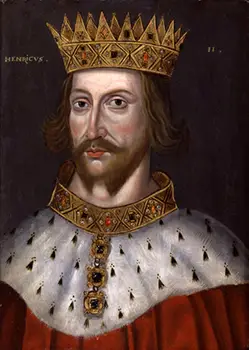Henry II
Henry II or Henry Curtmantle was King of England during middle to late 12th Century. He was also Count of Anjou, Count of Maine, Duke of Normandy, Duke of Aquitaine, Lord of Ireland and Count of Nantes. He briefly ruled Scotland, Brittany and Wales as well. He belonged to the House of Plantagenet. Henry II was an energetic man who was obsessed with the idea of taking back the territories once ruled by his maternal grandfather Henry I.

He is remembered for tremendously increasing his Anglo-French domain and strengthening Royal control over these territories. In doing so he resorted to incredible violence and brute force at times. Henry II squabbled with Thomas Beckett, Archbishop of Canterbury to assert control over administration of his kingdom and reform relationship with church. His later life was marred by power struggle against his sons and wife, Eleanor of Aquitaine.
This in-house strife brought his downfall. However, he left lasting influences on the future of England and is widely considered one of the most important rulers of the country’s long recorded history.

Early Life: Henry II was born on March 5, 1133 in Le Mans, France. His father, Geoffrey the Fair was the Count of Anjou and his mother; Matilda was daughter of Henry I King of England and Duke of Normandy. She was previously married to Henry V, the Holy Roman Emperor, but after his death she married Henry II’s father. She belonged to the powerful Norman family.
In 1135, Matilda’s father Henry I died and she hoped to claim the title herself. However; her cousin Stephen of Blois was crowned as King and Duke of Normandy. This started a struggle between the two during which Geoffrey invaded Duchy of Normandy. Matilda’s dream of taking English throne was to be fulfilled later by her son, Henry II.
Henry II spent his early childhood, shuttling between Normandy, Anjou and England. He was tutored by Peter of Saintes and William of Conches, two prominent academics of the time. At just fourteen years of age, Henry commissioned a small army and ventured into England. However; he had little success and was left in a difficult situation with no money to pay his troops’ salary with.
Surprisingly, he was bailed out by Stephen of Blois, the very person he had launched his campaign against.

Reign: Henry II was appointed Duke of Normandy in 1150 by his father, Geoffrey. In 1151, Geoffrey died and Henry II also took charge as Count of Anjou. The same year he married Eleanor of Aquitaine. Eleanor was formerly married to Louis VII of France.
With this marriage, Henry also came to possess Aquitaine and his territorial possessions inside France exceeded that of Louis. As a result Louis assembled a coalition against Henry. Henry fought a difficult war against several opponents simultaneously and won many battles. More importantly he survived and kept his territorial possessions intact.
In 1153, Henry II launched another campaign to take England and fought a prolonged battle of nerves against Stephen of Blois. His victories in several battles and superior military strategy forced Stephen to call for truce. A treaty was signed between the two sides called Treaty of Winchester. According to the treaty, Stephen appointed Henry II as his successor.
In 1154, Stephen of Blois died and Henry II succeeded him as King of England. In the next few years he began a concerted effort to strengthen and build a larger empire.

Later Life and Death: Later years of his life and reign were marred by tumultuous events like the Great Revolt when his sons revolted against him. This internal strife weakened his grip on the throne. He had to appoint his eldest son Young Henry as Junior King.
The in-fighting over control of different territories continued among his family members till Young Henry died in 1183. He then appointed his son Richard as his successor. His relationship with heir apparent also degenerated fast as Richard was in a hurry to take over from Henry.
Henry II eventually succumbed to a bleeding ulcer and died in 1189 at the age of 56. Richard succeeded him and was crowned King of England on July 6, 1189.




